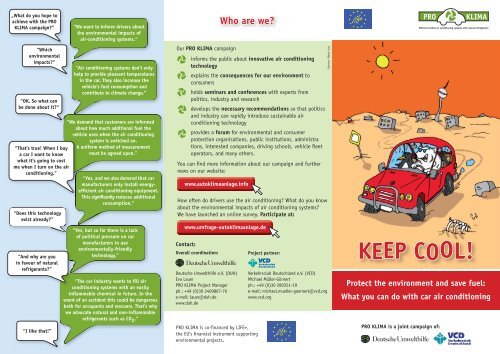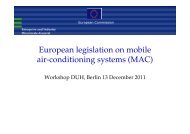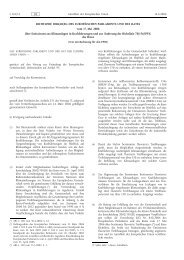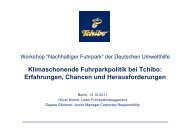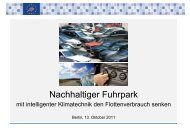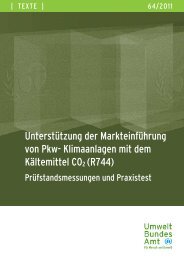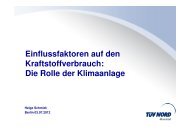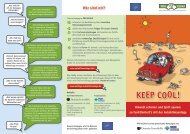"Keep Cool!"-Flyer (english, 2MB) - Pro Klima
"Keep Cool!"-Flyer (english, 2MB) - Pro Klima
"Keep Cool!"-Flyer (english, 2MB) - Pro Klima
You also want an ePaper? Increase the reach of your titles
YUMPU automatically turns print PDFs into web optimized ePapers that Google loves.
„What do you hope to<br />
achieve with the PRO<br />
KLIMA campaign?”<br />
“Which<br />
environmental<br />
impacts?”<br />
“OK. So what can<br />
be done about it?“<br />
“That’s true! When I buy<br />
a car I want to know<br />
what it’s going to cost<br />
me when I turn on the air<br />
conditioning.”<br />
“Does this technology<br />
exist already?”<br />
“And why are you<br />
in favour of natural<br />
refrigerants?”<br />
“I like that!”<br />
“We want to inform drivers about<br />
the environmental impacts of<br />
air-conditioning systems.“<br />
“Air conditioning systems don’t only<br />
help to provide pleasant temperatures<br />
in the car. They also increase the<br />
vehicle’s fuel consumption and<br />
contribute to climate change.”<br />
“We demand that customers are informed<br />
about how much additional fuel the<br />
vehicle uses when the air conditioning<br />
system is switched on.<br />
A uniform method of measurement<br />
must be agreed upon.”<br />
“Yes, and we also demand that car<br />
manufacturers only install energyeffi<br />
cient air conditioning equipment.<br />
This signifi cantly reduces additional<br />
consumption.”<br />
“Yes, but so far there is a lack<br />
of political pressure on car<br />
manufacturers to use<br />
environmentally-friendly<br />
technology.”<br />
“The car industry wants to fi ll air<br />
conditioning systems with an easily<br />
infl ammable chemical in future. In the<br />
event of an accident this could be dangerous<br />
both for occupants and rescuers. That’s why<br />
we advocate natural and non-infl ammable<br />
refrigerants such as CO2 .”<br />
Our PRO KLIMA campaign<br />
Who are we?<br />
informs the public about innovative air conditioning<br />
technology<br />
explains the consequences for our environment to<br />
consumers<br />
holds seminars and conferences with experts from<br />
politics, industry and research<br />
develops the necessary recommendations so that politics<br />
and industry can rapidly introduce sustainable air<br />
conditioning technology<br />
provides a forum for environmental and consumer<br />
protection organisations, public institutions, administra<br />
tions, interested companies, driving schools, vehicle fl eet<br />
operators, and many others.<br />
You can fi nd more information about our campaign and further<br />
news on our website:<br />
www.autoklimaanlage.info<br />
How often do drivers use the air conditioning? What do you know<br />
about the environmental impacts of air conditioning systems?<br />
We have launched an online survey. Participate at:<br />
www.umfrage-autoklimaanlage.de<br />
Contact:<br />
Overall coordination:<br />
Deutsche Umwelthilfe e.V. (DUH)<br />
Eva Lauer<br />
PRO KLIMA <strong>Pro</strong>ject Manager<br />
ph.: +49 (0)30 2400867-76<br />
e-mail: lauer@duh.de<br />
www.duh.de<br />
PRO KLIMA is co-fi nanced by LIFE+,<br />
the EU’s fi nancial instrument supporting<br />
environmental projects.<br />
<strong>Pro</strong>ject partner:<br />
Verkehrsclub Deutschland e.V. (VCD)<br />
Michael Müller-Görnert<br />
ph.: +49 (0)30 280351-19<br />
e-mail: michael.mueller-goernert@vcd.org<br />
www.vcd.org<br />
Cartoon: Mario Lars<br />
KEEP COOL!<br />
<strong>Pro</strong>tect the environment and save fuel:<br />
What you can do with car air conditioning<br />
PRO KLIMA is a joint campaign of:<br />
Effi cient mobile air conditioning systems with natural refrigerants
How does a car‘s air<br />
conditioning system work?<br />
1<br />
2<br />
4<br />
The air conditioning system in a car works like a refrigerator.<br />
The key technological element is the compressor. It circulates<br />
the refrigerant. With the aid of the refrigerant, the air from the<br />
vehicle interior is cooled.<br />
What happens to the refrigerant in the cycle?<br />
The warm air from the interior is fi rst fed to the<br />
evaporator 1 . Here the cold, liquid refrigerant takes<br />
the heat from the air of the vehicle interior and becomes<br />
gaseous – the refrigerant evaporates. The cooler air is<br />
fed back into the car’s interior.<br />
The compressor 2 draws in the now gaseous and hot<br />
refrigerant. Here it is compressed and compacted like in<br />
an air pump. This makes it even hotter.<br />
A fan ensures that cold exterior air fl ows around the hot<br />
refrigerant in the condenser 3 , cooling it and allowing<br />
it to discharge heat to the exterior air. After the<br />
refrigerant has passed through the condenser, it is cool<br />
and liquid again.<br />
Now the refrigerant fl ows through an expansion valve 4<br />
and cools down still further. Its pressure has dropped and<br />
it can once again absorb heat from the vehicle interior.<br />
The cold liquid refrigerant fl ows onwards to the evaporator<br />
and the cycle starts again.<br />
3<br />
+<br />
Advantages and Disadvantages Tips<br />
An air conditioning system is a popular extra and is installed<br />
in almost all new cars. This means there are approximately<br />
13 million new, air-conditioned vehicles in Europe every year.<br />
Comfort<br />
No one wants to miss out on cooling in a car when temperatures<br />
are high in the summer. Automatic air conditioning systems<br />
allow you to set the desired temperature directly in the vehicle.<br />
Safety<br />
A driver’s concentration diminishes noticeably at high<br />
temperatures. Moreover, an air conditioning system also helps<br />
to clear misted-up windows in winter – an important condition<br />
for safety in traffi c.<br />
–<br />
Health<br />
If the air conditioning is set incorrectly or poorly maintained, it<br />
can result in colds and circulatory problems. Mostly, a pollen fi lter<br />
which can clean the atmospheric air from harmful substances is<br />
missing. Allergic persons have increased breathing diffi culties.<br />
Environment & Costs<br />
The use of air conditioning increases fuel consumption and<br />
pollutant emissions. Depending on the vehicle model and type<br />
of air conditioning, this can be by 10 to 20 percent (up to two<br />
litres per 100 kilometres).<br />
Car air conditioning systems are not completely closed systems<br />
like refrigerators. In just one year, the conditioning system loses<br />
8 to 12 percent of the refrigerant through tubes and gasket rings<br />
at the compressor. That’s how it is released into the atmosphere.<br />
The refrigerant with the name R134a is used in almost every<br />
car and is extremely harmful to the climate. It pollutes the<br />
atmosphere 1.430 times more than CO 2 . Thus air conditioners<br />
contribute signifi cantly to global warming.<br />
<strong>Pro</strong>per use of the air conditioning protects the environment,<br />
your own health and also saves fuel...<br />
Ventilate the car well before each journey<br />
Open all the doors before you start driving in the summertime.<br />
This will lower the temperature of the heated car.<br />
Estimate the length of your trip<br />
For short trips, the air conditioning should be turned off –<br />
in order not to increase the fuel consumption.<br />
After starting, keep all windows closed<br />
Also necessary for manual systems: First set the fan to<br />
medium speed and turn on the recirculation mode. This<br />
prevents warm fresh air from outside being brought in<br />
when the system is switched on.<br />
Do not set the temperature too low<br />
The difference between the exterior and interior<br />
temperature should be as small as possible and not more<br />
than a maximum of six degrees. At an outside temperature<br />
of around 30 degrees, the interior temperature should<br />
only be cooled down to 24 degrees at most.<br />
Set the fan correctly<br />
It generally applies: The air fl ow should not directly aim<br />
at the body.<br />
Climatecheck instead of cost shock<br />
Experts recommend maintenance of air conditioning systems<br />
every two years - the reason is the enormous loss of refrigerant.<br />
If this cannot be compensated, the air conditioning<br />
system has to take a higher load and can be broken more<br />
easily. For maintenance, the refrigerant is drawn off the<br />
system and cleaned by external gases. After a function test,<br />
the system is refi lled with new refrigerant according to the<br />
manufacturer’s data. Not switching on the air conditioning<br />
system at all is not advisable as well: The refrigerant does<br />
not pass through the circulation anymore and thus it can’t<br />
grease the components and moveable parts optimally.<br />
Our air conditioning expert:<br />
Axel Holler<br />
www.klima-papst.de


